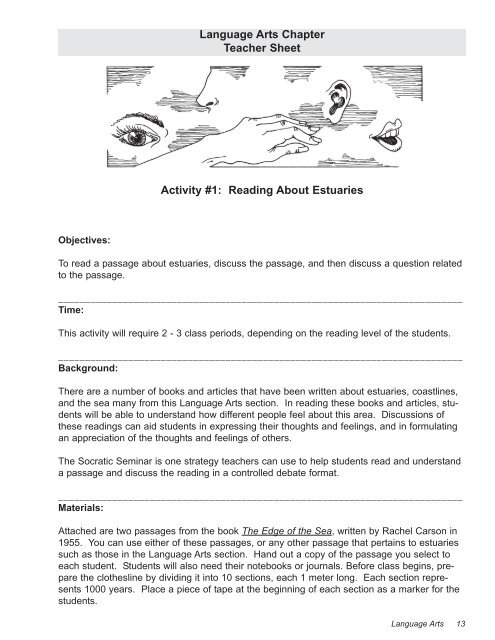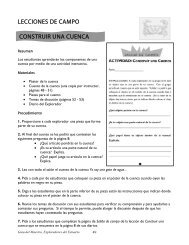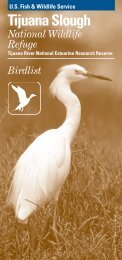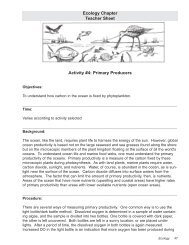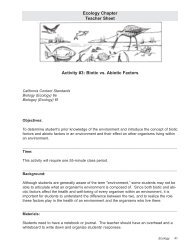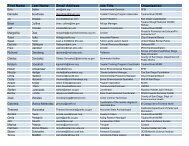Reading About Estuaries - Tijuana Estuary : TRNERR
Reading About Estuaries - Tijuana Estuary : TRNERR
Reading About Estuaries - Tijuana Estuary : TRNERR
You also want an ePaper? Increase the reach of your titles
YUMPU automatically turns print PDFs into web optimized ePapers that Google loves.
Language Arts Chapter<br />
Teacher Sheet<br />
Activity #1: <strong>Reading</strong> <strong>About</strong> <strong>Estuaries</strong><br />
Objectives:<br />
To read a passage about estuaries, discuss the passage, and then discuss a question related<br />
to the passage.<br />
___________________________________________________________________________<br />
Time:<br />
This activity will require 2 - 3 class periods, depending on the reading level of the students.<br />
___________________________________________________________________________<br />
Background:<br />
There are a number of books and articles that have been written about estuaries, coastlines,<br />
and the sea many from this Language Arts section. In reading these books and articles, students<br />
will be able to understand how different people feel about this area. Discussions of<br />
these readings can aid students in expressing their thoughts and feelings, and in formulating<br />
an appreciation of the thoughts and feelings of others.<br />
The Socratic Seminar is one strategy teachers can use to help students read and understand<br />
a passage and discuss the reading in a controlled debate format.<br />
___________________________________________________________________________<br />
Materials:<br />
Attached are two passages from the book The Edge of the Sea, written by Rachel Carson in<br />
1955. You can use either of these passages, or any other passage that pertains to estuaries<br />
such as those in the Language Arts section. Hand out a copy of the passage you select to<br />
each student. Students will also need their notebooks or journals. Before class begins, prepare<br />
the clothesline by dividing it into 10 sections, each 1 meter long. Each section represents<br />
1000 years. Place a piece of tape at the beginning of each section as a marker for the<br />
students.<br />
Language Arts 13
___________________________________________________________________________<br />
Procedure:<br />
Students should sit in groups of four. Begin by asking the students to read the selected passage.<br />
While they are reading, they should use the right-hand column of the paper to write<br />
down any words or phrases with which they might be unfamiliar. After the students have finished<br />
reading, ask them to discuss the words/phrases they wrote down with a partner to see if<br />
they can determine their meanings. Next, the two pairs in each group should discuss the<br />
passages.<br />
Ask students to volunteer a word or phrase that they had trouble with, along with any explanations<br />
or definitions their group might have come up with. Write this on an overhead or<br />
whiteboard. Ask other members of the class for their explanations of the words/phrases.<br />
Discuss the possible meanings, and decide on the correct meaning for the word/phrase. All<br />
students should then write the word or phrase, along with its meaning, in their notebook.<br />
Continue surveying the class in this way for other words or phrases students had trouble<br />
understanding. By the end of the class, the reading passage should have been thoroughly<br />
discussed, and all students should have a clear understanding of the entire piece.<br />
On the next day, ask the students to sit in two circles, one inside the other. Students sitting in<br />
the inner circle will participate in a debate/discussion. Students sitting in the outer circle will<br />
evaluate the performance of the student in the inner circle that they are sitting behind. The<br />
students in the outer circle must be completely quiet during the debate. They are to list in<br />
their notebooks how many times the student they are monitoring spoke, the quality of their<br />
comments, and how well the comments added to the debate. The evaluator's comments are<br />
to be shared ONLY with the person they are evaluating.<br />
After approximately 20 minutes of debate, the inner and outer circles should switch positions,<br />
and a new debate is started.<br />
Below are some sample questions you can use for the attached passages. Feel free to make<br />
up your own questions, also.<br />
Passage 1:<br />
Passage 2:<br />
1. In the passage we read yesterday, Rachel Carson described a world we cannot see<br />
unless we use a microscope. How important do you think this world is to the health of<br />
an estuary, and what do you think would happen if this unseen world no longer existed?<br />
2. In what ways does human activity affect the unseen world described by Rachel<br />
Carson in the passage we read yesterday, and should we be worried about those<br />
things that might affect it?<br />
1. Describe how you felt when you were on a beach at night, or describe how you<br />
might feel about being on a beach at night.<br />
2. How do you think the <strong>Tijuana</strong> <strong>Estuary</strong> will look 1,000 years from now? How will it<br />
be the same, and how will it be different.<br />
Language Arts 14
Passage 1:<br />
Name Period Date<br />
From The Edge of the Sea by Rachel Carson,<br />
1955<br />
We think of rock as a symbol of durability, yet<br />
even the hardest rock shatters and wears away<br />
when attacked by rain, frost or surf. But a grain of<br />
sand is almost indestructible. It is the ultimate<br />
product of the work of the waves - the minute,<br />
hard core of mineral that remains after years of<br />
grinding and polishing. The tiny grains of wet<br />
sand lie with little space between them, each holding<br />
a film of water about itself by capillary attraction.<br />
Because of this cushioning liquid film, there<br />
is little further wearing by attrition. Even the blows<br />
of heavy surf cannot cause one sand grain to rub<br />
against another.<br />
In the intertidal world, this minuscule world of the<br />
sand grains is also the world of inconceivably<br />
minute beings, which swim through the liquid film<br />
around a grain of sand as fish would swim through<br />
the ocean covering the sphere of the earth.<br />
Among this fauna and flora of the capillary water<br />
are single-celled animals and plants, water mites,<br />
shrimplike crustacea, insects, and the larvae of<br />
certain infinitely small worms - all living, dying,<br />
swimming, feeding, breathing, reproducing in a<br />
world so small that our human senses cannot<br />
grasp its scale, a world in which the micro-droplet<br />
of water separating one grain of sand from another<br />
is like a vast, dark sea.<br />
Not all sands are inhabited by this "interstitial<br />
fauna". Those derived from the weathering of<br />
crytstalline rocks are most abundantly populated.<br />
Shell or coral sand seldom if ever contains copepods<br />
and other microscopic life; perhaps this indicates<br />
that the grains of calcium carbonate create<br />
unfavorable alkaline conditions in the water<br />
around them.<br />
On any beach the sum of all the little pools amid<br />
the sand grains represents the amount of water<br />
available to the animals of the sands during the<br />
low-tide interval. Sand of average fineness is able<br />
to contain almost its own volume of water, and so<br />
at low tide only the topmost layers dry out under a<br />
warm sun. Below is damp and cool, for the contained<br />
water keeps the temperatures of the deeper<br />
sand practically constant. Even the salinity is<br />
fairly stable, only the most superficial layers are<br />
affected by rain falling on the beach or by streams<br />
of fresh water coursing across.<br />
Language Arts 15
Passage 2:<br />
Name Period Date<br />
From The Edge of the Sea by Rachel Carson<br />
Now I hear the sea sounds about me; the night<br />
high tide is rising, swirling with a confused rush of<br />
waters against the rocks below my study window.<br />
Fog has come into the bay from the open sea,<br />
and it lies over water and over the land's edge,<br />
seeping back into the spruces and stealing softly<br />
among the juniper and the bayberry. The restive<br />
waters, the cold wet breath of the fog, are of a<br />
world in which man is an uneasy trespasser; he<br />
punctuates the night with the complaining groan<br />
and grunt of a foghorn, sensing the power and<br />
menace of the sea.<br />
Hearing the rising tide, I think how it is pressing<br />
also against other shores I know - rising on a<br />
southern beach where there is no fog, but a moon<br />
edging all the waves with silver and touching the<br />
wet sands with lambent sheen, and on a still<br />
more distant shore sending its streaming currents<br />
against the moonlit pinnacles and the dark caves<br />
of the coral rock.<br />
Then in my thoughts these shores, so different in<br />
their nature and in the inhabitants they support,<br />
are made one by the unifying touch of the sea.<br />
For the differences I sense in this particular<br />
instant of time that is mine are but the differences<br />
of a moment, determined by our place in the<br />
stream of time and in the long rhythms of the sea.<br />
Once this rocky coast beneath me was a plain of<br />
sand; then the sea rose and found a new shore<br />
line. And again in some shadowy future the surf<br />
will have ground these rocks to sand and will<br />
have returned the coast to its earlier state. And<br />
so in my mind's eye these coastal forms merge<br />
and blend in a shifting, kaleidoscopic pattern in<br />
which there is no finality, no ultimate and fixed<br />
reality - earth becoming fluid as the sea itself.<br />
Language Arts 16


